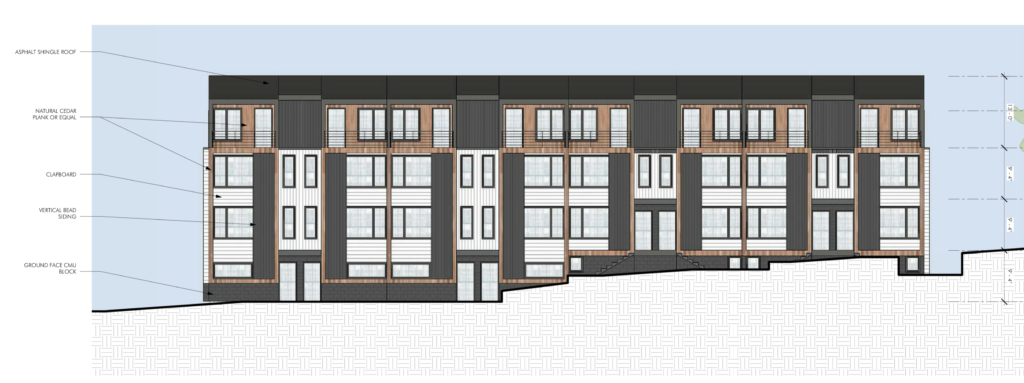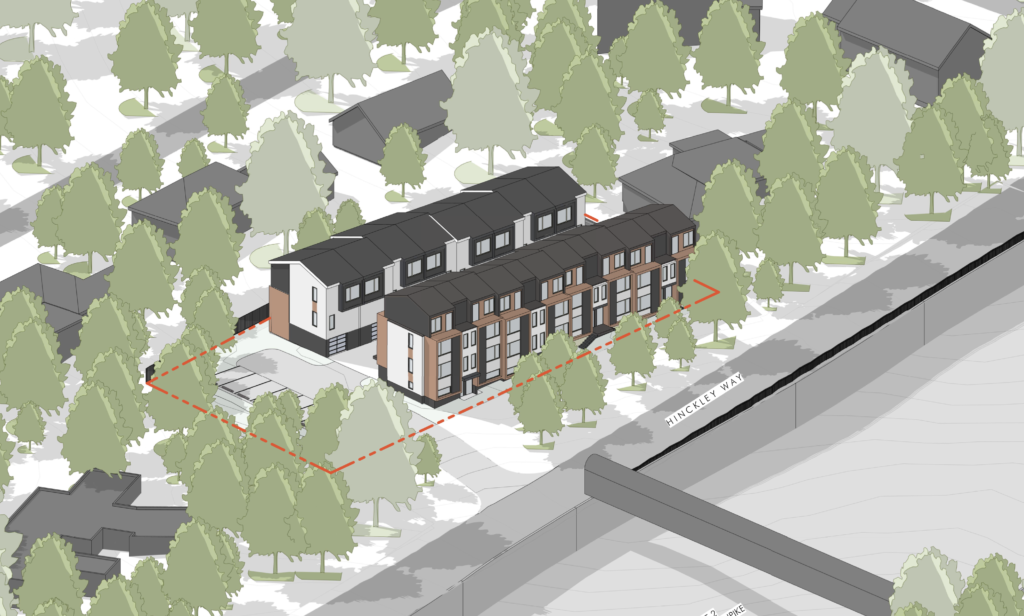Photo: An architectural rendering of the proposed 16 townhouse project off Frontage Road on Belmont Hill. (EMBARC)
The email message to this media outlet was a call to arms: “How can someone even think about placing an apartment complex in our neighborhood of homes? How?”
The consternation from at least one Belmont Hill resident comes as a Florida-based developer is proposing to build 16 townhouse units on approximately half an acre of land at 91 Beatrice Cir., located off of Frontage Road between Park Avenue and Pleasant Street.
The proposed project will highlight the Select Board’s Monday, June 1 remote virtual meeting at 7 p.m.
The development team has applied for a comprehensive permit under Chapter 40B, the sometimes contentious state law enacted in 1969 to promote the construction of low- and moderate-income housing.
The law allows developers to skirt local zoning regulations – such as for density and lot restrictions – if 20 to 25 percent of the project units have long-term affordability restrictions and the town’s housing stock is less than 10 percent affordable. The development team is setting aside four units as affordable to households earning 80 percent of the median income around Boston.
And Comprehensive Land will be seeking waivers from 10 zoning bylaws – including restrictions on attached apartments in the SR-A district, the requirement that a nonconforming development undergoes the Planning Board’s Design and Site Plan Review, minimum lot area, open space limited, yard setbacks and lot coverage, to name a few – and from the town’s stormwater management and control bylaw.

In a letter to Select Board Chair Roy Epstein dated May 13, MassHousing, the state agency that oversees 450B proposals, has already begun the process of reviewing the application and seeking information from the town on moving forward with the project.
For the developer, this townhouse project will allow moderate-income families the opportunity to live in Belmont.
“Through Chapter 40B’s streamlined permitting, the proposed project creates affordable rental opportunities, with larger units that have the potential to provide much-needed family housing,” said the developer in its application to MassHousing. “The average single home sales price in Belmont over the past twelve months exceeded $1,250,000.”
Comprehensive Land Holding, LLC – made up of Joseph, Jacob and Stephen Tamposi on this project – of the Gulf Coast community of Hernando has long roots in New England (Samuel Tamposi Sr. made the family fortune in real estate and business holdings in southern New Hampshire) constructing upscale homes in upscale communities such as Wayland while expanding to the Sunshine State where it built “our family’s flagship community.“
The Tamposi’s 40B project in Belmont is not their first in the area. In fact, the family has made quite a splash down in Milton where it’s proposing two large scale affordable projects totaling 252 units with 380 parking spaces.

The developers purchased the existing structure – a seven-room brick ranch built 72 years ago – after a wave of activity as the property was sold three times in the past three years. The 2,700 sq.-ft. structure was bought for $1.4 million, a cool $300,000 over the assessed value.
The project consists of a pair of buildings – laid out east to west on the lot – each with eight connected wood-framed townhouses. The southern row of housing will consist of three bedrooms in three stories, 1,480 sq.-ft townhouses; the building closest to Frontage Road will be four bedroom, four stories at 1,800 sq.-ft.
There will be a parking space inside each townhouse and 10 additional spaces for overflow parking. The lot is situated across from a number 84 MBTA bus stop with access to Alewife Red Line station.
The unnamed Belmont project is following a decade long development trend of building residential apartment and condominium blocks along Route 2 inbound towards Cambridge. Multi-unit blocks now dot the landscape from the Belmont line – including the Royal Belmont – to a recently opened 320-unit apartment complex where the Lanes & Games bowling alley and the Gateway Motel once stood.